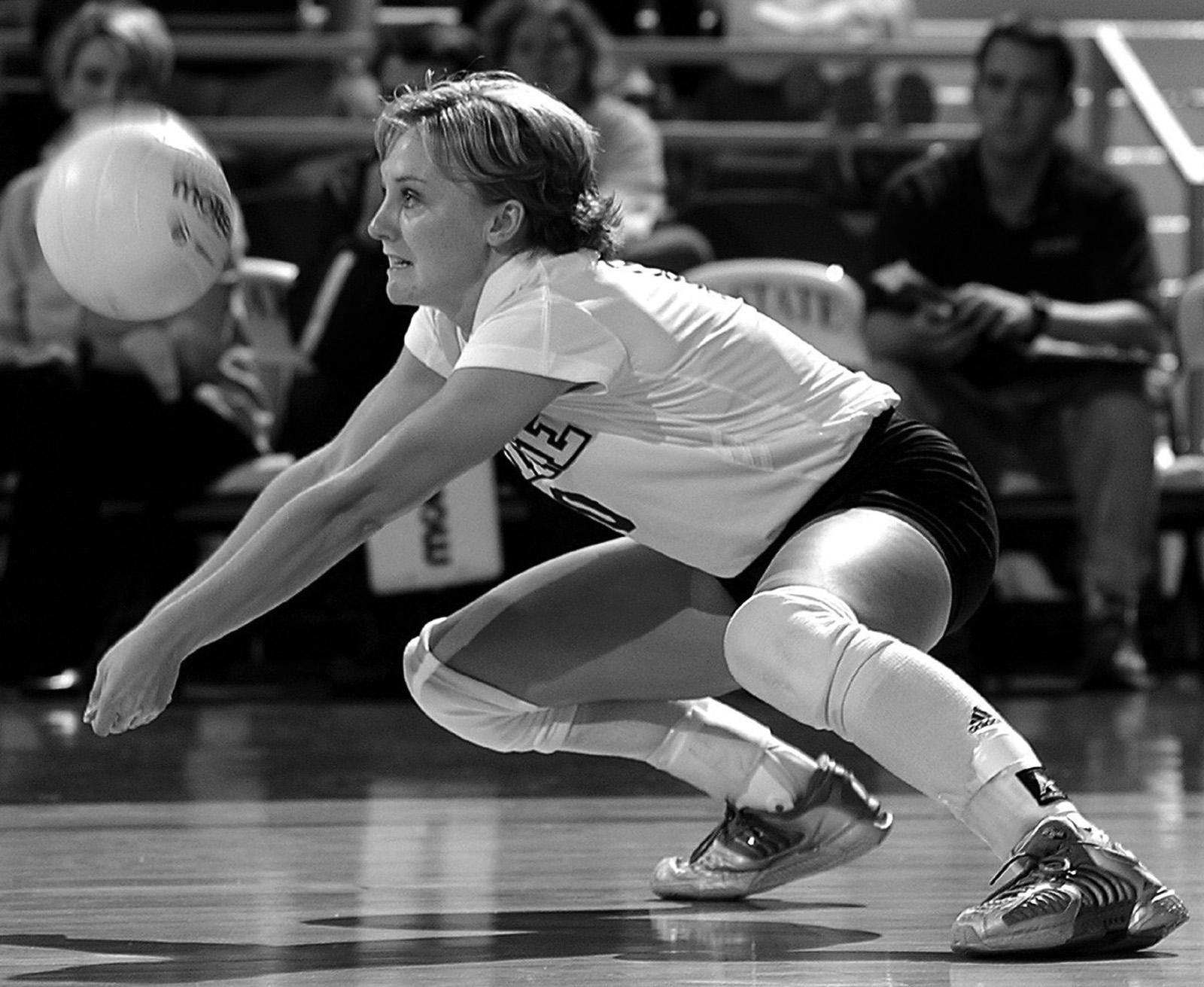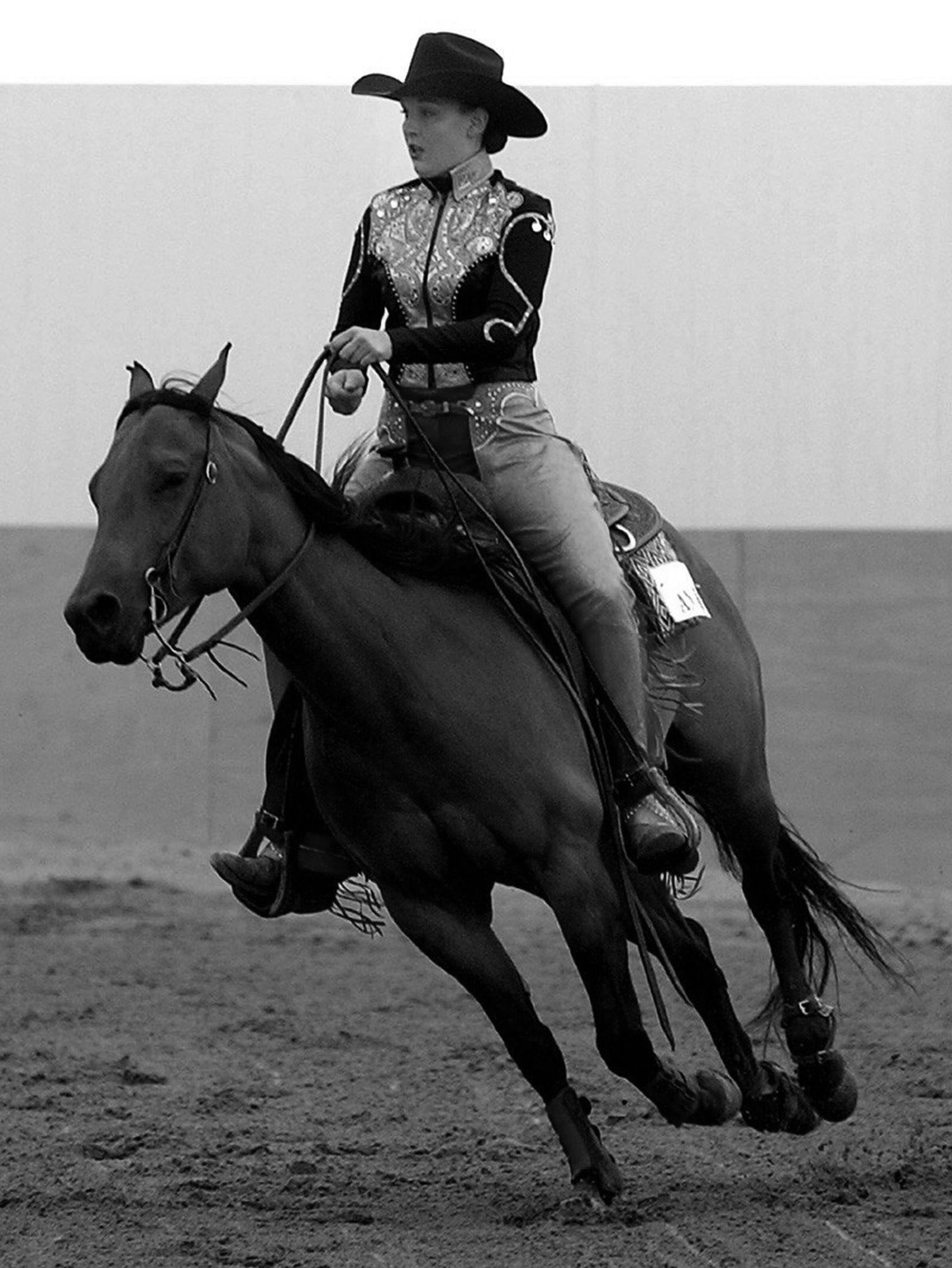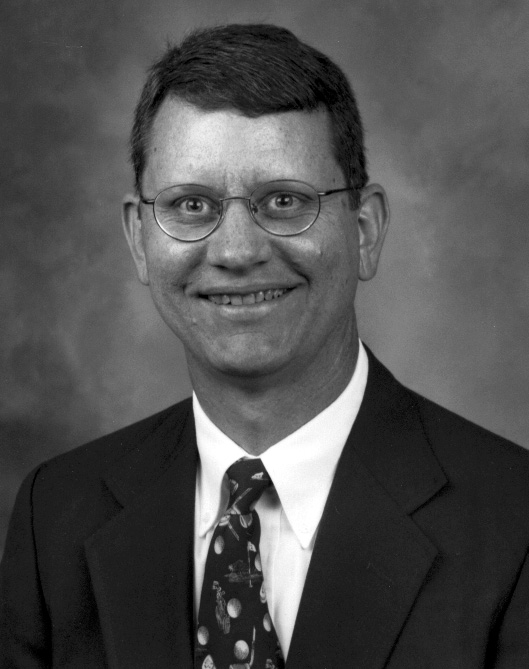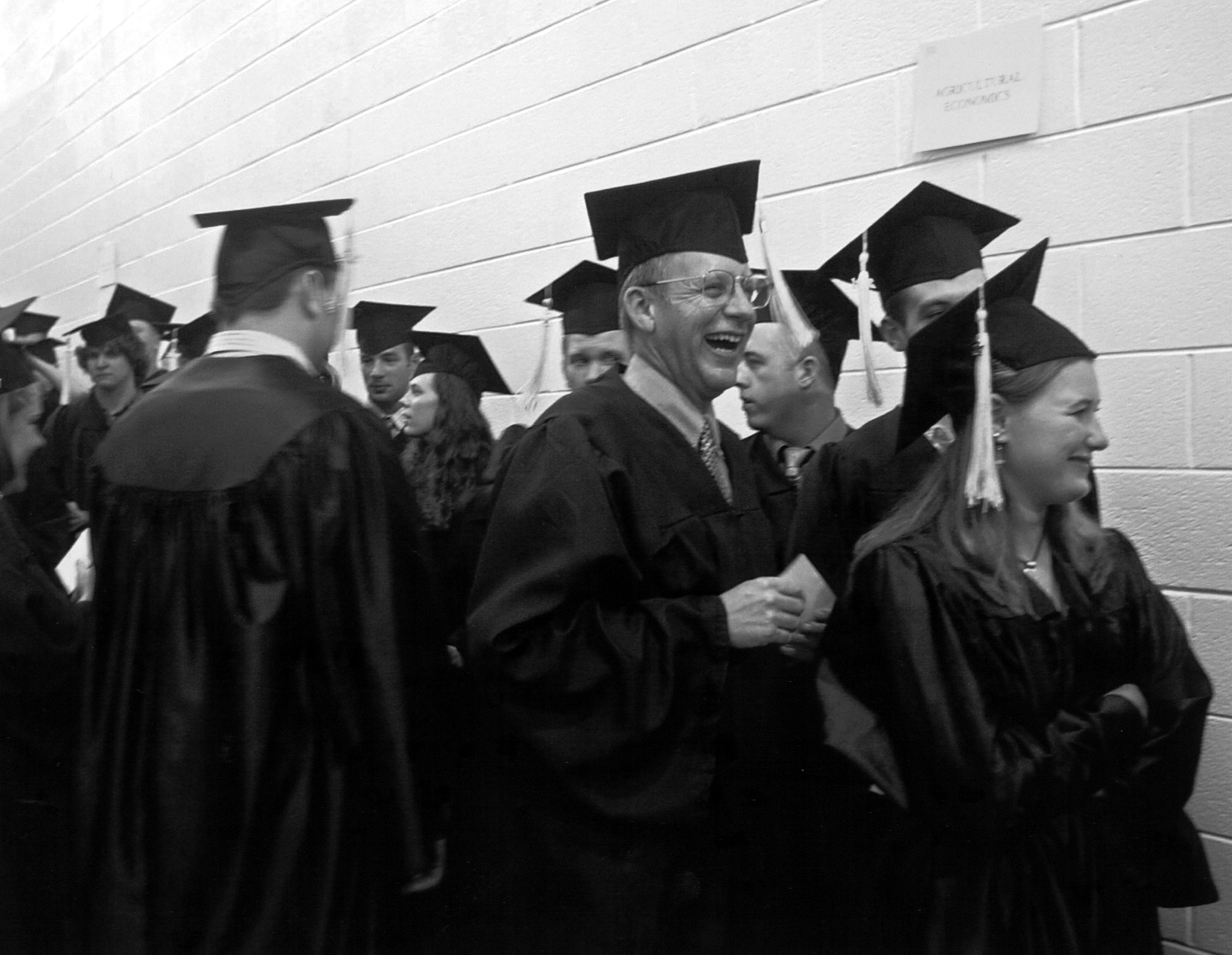2004 Exchange
Going the academic distance
Agmanager.info: Where the ag world meets
Weighing in on the Atkins Diet
Extra-celebratory commencement
K-State Research and Extension names new ag economics leader
Sustained effort required for BSE protection
David Norman 2004 Commerce Bank Distinguished Faculty Award recipient
Agricultural Economics United Way project results in increased donations
Going the Academic Distance: Student Athletes Shine
Facts don’t lie. For student athletes the facts show a professional career in their given sport is highly unlikely. According to the NCAA, there are nearly 1 million high school football players and about 550,000 basketball players. Of that number, about 250 make it to the NFL and about 50 make an NBA team. The odds of a high school football player making it to the pros at all-- let alone having a career--are about 6,000 to 1; the odds for a high school basketball player-- 10,000 to 1.
For athletes pursuing their sport at K-State, if the pros are not a realistic part of the future, what causes them to invest thousands of hours training and conditioning in an already demanding college environment? Our student athletes in the Department of Agricultural Economics take a hard look at those numbers and think about what will matter in the long run--a college education with a foundation in dedication, perseverance and excellence.
This year the department had four students involved in college athletics. Craig Smith, graduate student and javelin thrower, men’s track and field; Brandi Vogel, senior and western rider, women’s equestrian; Blake Bauer, May ‘04 graduate and reserve guard, men’s basketball; and Kris Jensen, senior and defensive specialist, women’s volleyball.
 Whether or not to be involved in track and field was never a question for Craig Smith. It was another goal he set to achieve in life.
Whether or not to be involved in track and field was never a question for Craig Smith. It was another goal he set to achieve in life.
“I see both athletics and academics as a challenge. And I love a challenge,” Smith said. “My competitiveness and desire for excellence carries over into both of these areas. I set goals and do everything possible to achieve them.”
Achievement is possible because of hard work, and Smith is the first to say athletics and academics each require a different, if not equal, work ethic.
“Working on my master’s in agricultural economics is definitely a challenge, but academics is only a mental workout while the Javelin is both men- tal and physical,” Smith said, then grinning, “Trying to master the technical aspects of the javelin has caused me to lose a lot of sleep at night. But would I rather write a 20 page paper or go to a track meet in Florida? Let me think about that.”
A typical day for Smith involves getting up at 6 a.m. and lifting for an hour. Following a full day of classes, Smith has an hour and a half practice. In the evening, he grabs a meal and spends time with friends, then returns to school to catch up on his homework.
“During the season, track meets are usually on Friday or Saturday so if they are close by, I don't miss much class,” Smith said. “Until grad school I didn't have to worry about studying much or doing homework. Graduate school, however, is a little different story. Time management is very important here. My wife is on the KSU Volleyball team so it is nice that she can relate to this kind of a schedule.” Excellence has been a hallmark of Smith on and off the field. Smith holds the Kansas State school record in javelin at 237'8". Even while pursuing excellence on the field, Smith doesn’t allow himself to slip in his course work.
“At times, especially in-season, it can be pretty hectic but I have never seen athletics as an excuse for poor classroom performance. Unless I am going to miss multiple classes or an exam, I never even mention to the teacher that I am an athlete. I feel it is my responsibility to get my work done just like any other student. I take a lot of pride in doing this,” Smith said.
Dan Bernardo, department head, believes it is this type of humility that department faculty recognize in many student-athletes.
“Our student-athletes represent some of the best K-State offers. What they do on the field or court pales in comparison with their efforts and achievements in the classroom,” Bernardo said.
With only one semester left before Smith finishes his master’s degree, and a new wife beside him (Smith was married this summer in July) there is still much he is looking forward to.
Along with an irreplaceable degree, Smith sees himself incorporating athletics into his lifestyle for years to come.
“Sports will always be a huge part of our (and probably our kids as well) life. Javelin is one of those events that takes years to master so I might pick one up again after a few years off and see what I can do,” Smith said.
 Kris Jensen, Senior Agribusiness Defensive Specialist - Women’s Volleyball Fowler, Colo. (Fowler HS)
Kris Jensen, Senior Agribusiness Defensive Specialist - Women’s Volleyball Fowler, Colo. (Fowler HS)
A 5-foot-8 defensive specialist from Fowler, Colorado, Jensen leaves Kansas State as one of the better defensive and serve specialists in recent history. Jensen finished with 622 digs in her career, averaged 2.16 digs per game throughout her career, and totaled 10 or more digs in 20 career matches. A float-serve specialist, Jensen also had 73 serv- ice aces in her career, including 29 in 2003. She collected at least one service ace in 49 matches in her career and at least two in 16 matches. A three-time Academic All-Big 12 selection, Jensen has been named to the Big 12 Commissioner's Honor Roll and the University Dean's List all six semesters at Kansas State.
 Brandi Vogel, Senior Agricultural Economics, Western Rider - Women’s Equestrian, Lenexa, Kan. (Northwest HS)
Brandi Vogel, Senior Agricultural Economics, Western Rider - Women’s Equestrian, Lenexa, Kan. (Northwest HS)
A member of the women’s equestrian team, Vogel concluded an impressive career as a Wildcat in 2004. She advanced to IHSA (Intercollegiate Horse Show Association) Nationals for the third consecutive year, but did not place in open horsemanship. Vogel helped the team finish seventh at the Varsity Equestrian Championships where she finished fourth in the first class of reining. She tied for High-Point Rider honors at South Carolina on Feb. 8 where she also collected a first-place finish in open reining. Vogel added Reserve High-Point Rider status at the Western Point Show on Feb. 22 after she finished first in open horsemanship and fourth in open reining. In addition, she captured first-place honors in open reining at Black Hawk College on March 7.
One of the most decorated riders in the program’s history, Vogel brought home Kansas State’s first-ever individual national championship in the sport in 2002 in advanced horsemanship. She followed that with a fourth and 10th-place finish, respectively, in open horsemanship and open reining.
Blake Bauer, May ‘04 graduate Agricultural Economics, Guard – Men’s Basketball, Clay Center, Kan. (Clay Center HS)
A 6-foot-2 reserve guard on the Kansas State men’s basketball team, Bauer saw action in four games for the Wildcats in 2003-04. He totaled five minutes on the season with one field goal attempt and one assist in five total minutes. Bauer registered minutes in contests against Birmingham-Southern (11/21), Lipscomb (11/25), Texas A&M-Corpus Christi (12/20) and Savannah State (1/10). He posted one assist in a career-best two minutes of action against Savannah State. He was named a first team Academic All-Big 12 selection. He was the 12th Wildcat to earn first team honors, including the fifth since 2001.
![]()
www.agmanager.info: Where The Ag World Meets
In March 2003 the website www.agmanager.info was launched to consolidate the Department of Agricultural Economics’ research and outreach materials into one convenient location. Today, an average 20,000 people use AgManager each month, making it one of K-State Research and Extension’s most frequented sites.
Department Head, Dan Bernardo, explained since the beginning, the vision for AgManager was to be the first source for ag management information in Kansas.
“We hoped that AgManager would be a success, but we have been pleasantly surprised by the website’s acceptance across Kansas, the Midwest, and now the world,” Bernardo said.
The success experienced by AgManager is steeped in a foundation of research integrity, accuracy, and practicality.
“The website bears the K-State name, which validates the information available. Producers and businesses have trusted K-State in the past and continue to do so in an online form,” Bernardo stated.“Online Kansas producers are accessing our comprehensive research materials, but they are doing it in manner conducive to their personal schedules,” But its not only Kansas producers reaping benefits from the research and information available on agmanager, statistics show that users from across the globe are visiting agmanager for information and practical tools.
Visitors to AgManager represent more than 18 different countries.
Rodney Jones, faculty contributor to AgManager, says this global representation is due to the fact that AgManager has tapped an unmet need within the agriculture community.
“Agmanager is one of only a few websites with information on ag management and marketing focused on the user. We offer good, useful information in a form that people across the globe can utilize,” Jones said. “No matter where you are in the world, the basic techniques, principles, and tools are the same. So if information is organized in a user-focused manner, people will find it and apply it.”
Kevin Dhuyvetter, a lead faculty member in agmanager, believes the website’s success is found in its continually updated, quality information.
“Agmanager is never stale because new farm management information is added daily. The content, as well as the forms in which it is delivered, whether charts, graphs, or audio streaming means people can get the informa- tion they need in the form they prefer.
Weighing In On The Atkins Diet
The Atkins diet has revolutionized the dieting trend. According to Knight Ridder, an estimated 17 million Americans are currently following a formal low-carb diet and another
42 million are cutting back on carbohydrates.
The success of this diet seems to be attributed to a multitude of factors, the most important being that individuals can eat many of the foods that they love and scientific research has shown that the Atkins diet can result in weight loss.
 It’s not just those who lose weight who are profiting from the Atkins diet. Beef demand in the United States has been increasing in recent years, said James Mintert, professor of agricultural economics at K-State.
It’s not just those who lose weight who are profiting from the Atkins diet. Beef demand in the United States has been increasing in recent years, said James Mintert, professor of agricultural economics at K-State.
Mintert recently calculated that beef demand during the fourth quarter 2003 was 10 percent higher than during fourth quarter
2002. And despite the recent report of bovine spongiform encephalitis, or Mad Cow disease, in Washington state, domestic consumer demand appears to be holding up well.
"Obviously, the beef industry is reaping the benefits of the diet," Mintert said. "The increase in beef demand has helped make producers more optimistic about the future. They love it."
The question, however, is just how much of that increase should be attributed to the Atkins diet.
"It's not the only factor driving the beef demand," he said. "What we're seeing is a reversal of a long-term trend." Mintert said although the Atkins diet has had a positive impact on the trend, other factors include intro- duction of new easy-to-prepare beef items to the market and the recent rebound of the U.S. economy.
The demand reversal began in 1998 after a nearly 20-year slump that resulted in beef demand declining about 50 percent. Since 1998, beef demand has improved markedly. Beef demand index calculations reveal that beef demand during 2003 was about 16 percent higher than during 1998. Mintert said growth in the beef industry driven by the Atkins diet is positive, but he remains skeptical as to how long it will last.
It seems the Atkins diet will leave a lasting impression. According to Forbes.com, analysts predict that the low-carb movement will continue through 2004 and then gradually decline, but that the number of people limiting carbs will actually rise.
![]()
A Walk-Through 29 Years Later Makes For Extra-Celebratory Commencement
 David Hurrelbrink earned his bachelor’s degree in agricultural economics from K-State in December of 1975. Nearly three decades later, the father of two finally donned his cap and gown to walk through the College of Agriculture’s commencement ceremony Saturday, May 22, 2004.
David Hurrelbrink earned his bachelor’s degree in agricultural economics from K-State in December of 1975. Nearly three decades later, the father of two finally donned his cap and gown to walk through the College of Agriculture’s commencement ceremony Saturday, May 22, 2004.
The event was double special for the Hurrelbrink family: he watched his daughter, Amy, get her degree at the College of Arts and Sciences ceremony early in the day.
“The price was palpable almost,” he said, of watching Amy get her diploma and then taking part in the ceremonies himself. He said he wished his mother and father were still alive to see him walk across the stage.
Thinking back to 1975 Hurrelbrink said at the time he wasn’t really interested in participating in commencement.
“I didn’t even care,” he said, noting it was the 70s and being anti-establishment was cool. Add in the fact that he was a December graduate and would have had to come back for spring ceremony - the university didn’t have December ceremonies at the time - and he just never walked. “I left school, got a job, got married and then changed jobs, all by May,” he said.
It wasn’t until Hurrelbrink watched his son, Bill, participate in commencement about a year and a half ago that he realized he had missed out on something important.
“I really enjoyed my son’s graduation. I was so very proud of him and maybe just a little bit envious of his ceremony,” he said.
The idea to return for a commencement grew out of a conversation with Pat Bosco, dean of Student Life at KSU, in which Hurrelbrink expressed his regret at not having taken part in commencement. Bosco went to Beth Unger, chair of K-State’s commencement committee, who arranged for Hurrelbrink to walk through commencement this spring.
“Once a Wildcat, always a Wildcat,” Unger said.
Hurrelbrink and his wife of 28 years, Patricia, own and operate August Resources LLC in Kansas City. The company sells spare parts for military vehicles.
![]()
K-State Research & Extension Names Ag Economics Leader
K-State professor of agricultural economics, Dr. James Mintert, has accepted a four-year appointment as the Extension state leader for agricultural economics now that Barry Flinchbaugh has stepped down. Mintert is the livestock marketing specialist with K-State Research and Extension.
![]()
Sustained Effort Required For BSE Protection
Well before the first U.S. case of mad cow disease was discovered in December, Sean Fox's studies of the risks led him to warn, "the disease barrier between cattle and humans is not yet as strong as it could be."
Writing in the February 2003 edition of the agribusiness newspaper Feedstuffs, Fox said that if BSE were discovered, strengthening that barrier would "provide solid evidence to back up any claims about the safety of beef, and help minimize, to the benefit of the industry, the inevitable consumer panic."
Fortunately, the December discovery in Washington state appears to have been an isolated incident limited to one cow. But Fox, a Kansas State University agricultural economist, is sticking by his original call for more precautions. Any future incidents of bovine spongiform encephalopathy (BSE) might be more widespread and erode consumer confidence.
Fox, a Food Safety Consortium researcher who is examining BSE's effects on markets, noted several months before the BSE case discovery that the U.S. ban on feeding ruminant-derived protein to cattle and sheep would prevent a disease spread in cattle if properly enforced. But he pointed out that the General Accounting Office said that isn't being done.
The GAO also reported that some foods contain traces of bovine brain or spinal cord so it recommended that warning labels be placed on foods that might contain them. The U.S. Department of Agriculture rejected the suggestion, maintaining that warnings should be reserved for known hazards and there was no current BSE hazard.
"This 'we don't have it and the risk is low' approach has been used before," Fox wrote in Feedstuffs. "It was essentially the same approach taken in Germany and Japan where official 'BSE free' rhetoric backfired with the devastating economic consequences when the first cases were discovered."
Fox acknowledged that because the risk to human health from BSE is so low, a ban on nervous tissue or the use of warning labels would probably not have much impact in protecting public health. However, in June 2003 in The Kansas City Star, he argued that if BSE were dis- covered in the U.S., a ban on nervous tissue might be a good economic strategy because "by offering additional reassurance to consumers, it could reduce the cost of a BSE case for the beef industry, the fast food sector and the taxpayer."
In the Star commentary, Fox also called for the introduction of a national animal identification system. In January, Agriculture Secretary Ann Veneman told a congressional committee that USDA would work to speed up development of a national identification system, a project that has been in the works since mid-2002.
The infected Holstein that was discovered in Washington was traced back to a farm in Alberta, but Fox said the present system does not guarantee results in all cases.
"At this time, we do not have the capability to reliably trace a cow back to its farm of birth and, equally important, to find all its cohorts or offspring and eliminate them from the food chain," he said. "The ability to do so would reassure consumers and export markets that all potential cases related to one found could be detected and prevented from entering the food system."
A national identification system is very complex to establish and the current USDA effort started from scratch, Fox explained. European nations that have a system in place established theirs decades ago. In the U.S., several pilot projects are going on in different states in various stages of progress, he said.
The U.S. ban on feeding ruminant-derived protein to cattle and sheep, implemented in 1997 by the Food and Drug Administration, is similar to a 1988 ban that was enacted in the United Kingdom, which Fox said failed because of cross-contamination between ruminant and non-ruminant feed. By 2001, the European Union completely banned feeding meat and bone meal to all farm animals and fish, followed by Japan.
"It seems unlikely that the FDA ban provides adequate assurance that ruminant feed does not contain prohibited material," Fox said.
![]()
David Norman 2004 Commerce Bank Distinguished Faculty Award Recipient
 Internationally recognized scholar in international agricultural development is K-State's 2004 Commerce Bank Distinguished Graduate Faculty Award recipient. The honoree, David Norman, professor of agricultural economics, will receive a $2,500 honorarium. The award is supported by the William T. Kemper Foundation and the Commerce Bancshares Foundation and is coordinated through the KSU Foundation.
Internationally recognized scholar in international agricultural development is K-State's 2004 Commerce Bank Distinguished Graduate Faculty Award recipient. The honoree, David Norman, professor of agricultural economics, will receive a $2,500 honorarium. The award is supported by the William T. Kemper Foundation and the Commerce Bancshares Foundation and is coordinated through the KSU Foundation.
As the Distinguished Graduate Faculty honoree, Norman will be officially recognized at the fall 2004 commencement ceremony for the Graduate School. He also will each present a public lecture about his area of scholarship to the university community during the 2004-2005 school year.
"We're pleased to present this prestigious award to Dr. Norman and want to thank Commerce Bank and the William T. Kemper Foundation for helping K-State honor this out- standing faculty member," said Jon Wefald, K- State president. "The international expertise and reputation that Dr. Norman has earned in his field is why he is among K-State's most outstanding teachers and scholars."
Norman has earned recognition for his work both at K-State and abroad. He teaches international agricultural development and an undergraduate course on the global agricultural economy, hunger and poverty. He also has taught production economics.
Norman conducts research through K- State Research and Extension. His expertise is in farmer-based research, sustainable agriculture and farming systems research and extension. In addition, he is the major profes- sor for several students at both the master's and Ph.D. levels and often serves as an advis- er overseas, including in Africa, Asia, the South Pacific, Latin America and Europe. His advisory work includes making presentations, conducting training courses and designing and evaluating research and development projects and programs in conjunction with national programs or through international organizations or agricultural research centers. "David Norman is one of the world's most renowned scholars in the area of international agricultural development," said Daniel Bernardo, head of K-State's department of agricultural economics. "Dr. Norman is recog- nized as a co-founder of the farming system approach to agricultural development, which has remained one of the dominant developmental strategies aimed at improving the agricultural productivity of developing countries for more than 20 years.
"He has shared his expertise in more than 90 countries and today still spends much of his time traveling the globe to assist in the planning and assessment of agricultural development projects," Bernardo said.
Norman first became associated with K-State as a member of a rural economic research team at Ahmadu Bello University in northern Nigeria. He officially joined K-State as an assistant professor in 1968 but continued with his work at the Nigerian university. He was promoted to associate professor and moved to Manhattan in 1976. He earned the rank of full professor in 1978. From 1982 to 1990 Norman headed an agricultural technology improvement project in Botswana. The $12.9 million project, through the U.S. Agency for International Development and the Mid- America International Agricultural Consortium, involved implementing a farming systems research program in two areas of eastern Botswana. K-State, a member of the consor- tium with four other universities, served as the lead institution for the project.
His international experience has also benefited K-State's graduate program in agricultural economics, Bernardo said.
"Because of his international reputation, students come from across the globe to work and study with Dr. Norman. In the last 13 years he has served as major adviser to more than 30 graduate students in the departments of agricultural economics and economics. His students leave K-State with outstanding training and impressive publication records. As a result, they are highly sought by international agencies, private consulting firms and universities," Bernardo said.
Norman is the author or co-author of more than 200 publications and more than 50 consultancy reports. His work has been nominated for the American Agricultural Association Award for Publication of Enduring Quality.
In both 1999 and 2000 he was nomi- nated for the World Food Prize, the highest individual honor for outstanding achievement in improving the world's food supply. In 2002 he was given a Special Award by the International Farming Systems Association for outstanding scientific contributions, dedication and commitment to farmers and communities worldwide. He is also a Fellow of the Royal Society of the Arts in the United Kingdom.
At K-State, he received a Faculty of the Spring Semester Award in 2000 from the College of Agriculture for his contributions to the college's undergraduate program. He also received the university's first International Education Award in 2003.
Norman has been a member of Sigma Xi, the scientific research society, and Phi Kappa Phi, a national academic honor society. He graduated from Wye College of the University of London in England. He earned a master's degree and a doctorate from Oregon State University.
![]()
Agricultural Economics United Way Project Results in Increased Donations
It was easy to see that the United Way of Riley County’s annual campaign was in full force. Signs on the street, packets in the mail, and activities around Manhattan were underway. But what many did not know was the the origin of research that helped shape the university campaign was a classroom in Waters Hall.
As a final project in her “Risk Management” course, Hikaru Peterson, assistant professor, asked her students to design a K-State campaign plan for the United Way of Riley County.
The goal of the project, Peterson said, was to teach students how to create convincing management plans that account for uncertain events. According to Peterson the students were requited to include realistic numbers of what the cam- paign could achieve, the average donation per person, and the number of expected participants. “I think the part that the United Way was most interested in was what students thought of donating to the United Way, the perception of the United Way on campus, and what might motivate people to give,” Peterson said.
Peterson said she is pleased to know that this project has resulted in community outreach in addition to the intended education and research.
“The whole point of me putting this together was that I wanted to give a real case scenario to the students. The fact that I can give back to the United Way is a bonus.” Maxine Coffey, executive director of the United Way of Riley County, was impressed with the students’ work.
“I was just struck by the professionalism of the students and their presentations. It certainly speaks well of their instruction, and the insights they provided were very compelling.”
The research translated into a successful campaign in a year when the economy made contributions lower across the country. The K-State United Way campaign brought in more than $ 104,025.05, a 24% increase from the year before.
Back to top
